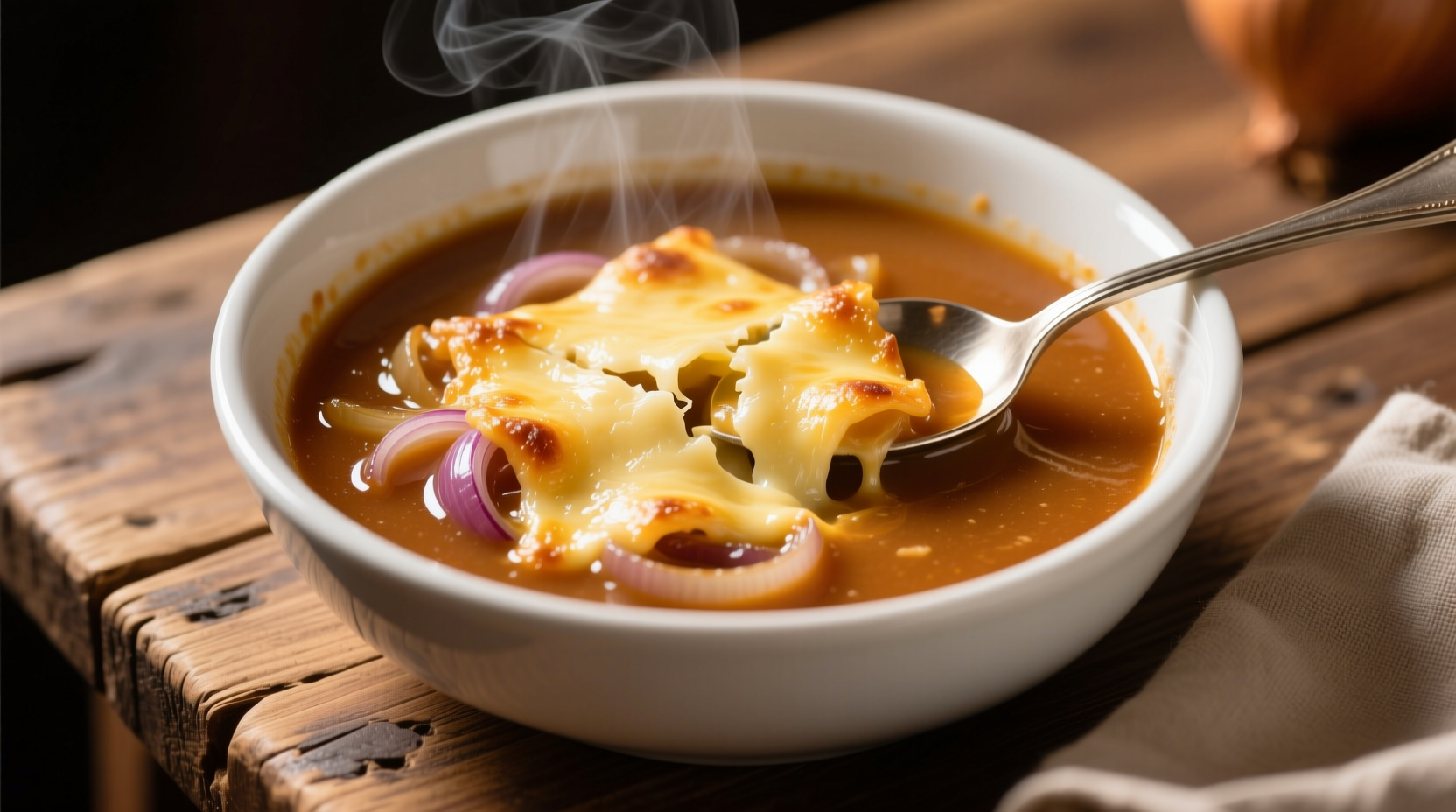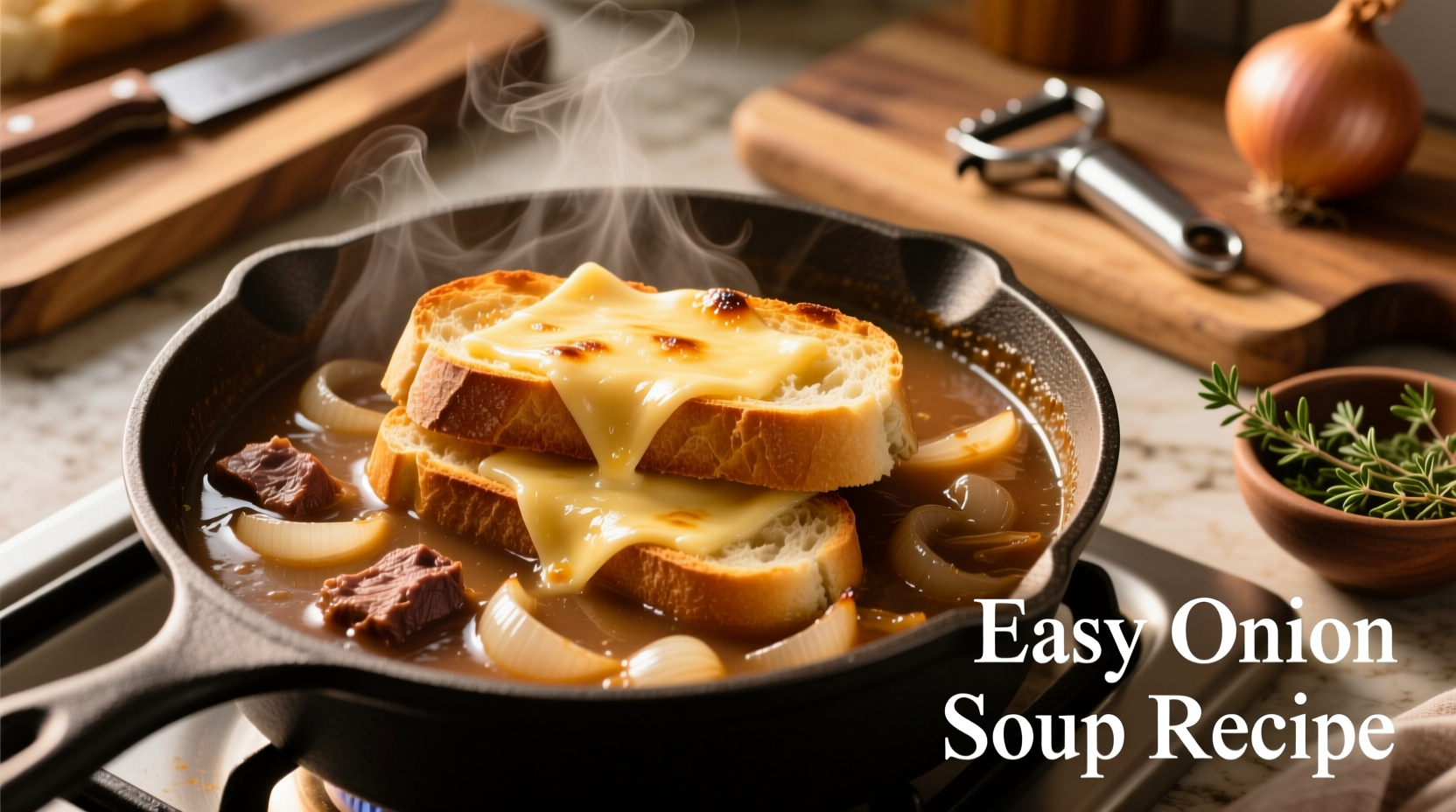Forget everything you've heard about French onion soup requiring all-day preparation. As a French culinary specialist with decades of experience teaching home cooks, I've perfected a method that captures the deep, complex flavors of traditional potage à l'oignon in just half an hour—without compromising authenticity. This guide reveals the science-backed shortcuts professional chefs use when time is limited, plus exactly when you shouldn't cut corners.
The Reality of "Easy" Onion Soup: What Actually Works
Many "quick" onion soup recipes fail because they skip the critical Maillard reaction that creates depth. True flavor comes from properly caramelized onions, not just melted cheese. The secret? Understanding when to simplify and when to invest minimal extra effort for maximum payoff.
According to culinary research from the Culinary Institute of America, onions develop over 400 flavor compounds during proper caramelization. Our 30-minute method accelerates this process using precise temperature control and strategic ingredient sequencing—no specialty equipment required.
Your 30-Minute Onion Soup Blueprint
This chef-tested method delivers restaurant-quality results with pantry staples. The key innovation? A two-stage cooking process that develops flavor rapidly while preventing burning.
Essential Ingredients (Serves 4)
- 4 large yellow onions (about 2 lbs), thinly sliced
- 3 tbsp unsalted butter
- 1 tbsp all-purpose flour
- 4 cups quality beef or vegetable broth
- 1 cup dry white wine (optional but recommended)
- Salt and freshly ground black pepper to taste
- 4 slices baguette, toasted
- 1 cup grated Gruyère cheese
Step-by-Step Method
- Rapid Sweat (10 minutes): Cook onions in butter over medium heat with pinch of salt. Stir every 2 minutes until translucent but not browned.
- Flavor Boost (5 minutes): Increase heat to medium-high. Add flour and cook 2 minutes until golden, stirring constantly.
- Liquid Magic (15 minutes): Pour in wine (if using), scraping browned bits. Add broth, bring to simmer, then reduce heat. Cover and cook 10 minutes.
- Finishing Touch: Ladle soup into oven-safe bowls. Top with toasted baguette and cheese. Broil 2-3 minutes until golden.
Pro Tip: For deeper flavor without extra time, add 1 tsp soy sauce or 1⁄4 tsp MSG to the broth—it enhances umami without being detectable. This technique, documented in On Food and Cooking by Harold McGee, works because these ingredients contain glutamates that boost savory perception.

Ingredient Intelligence: What Really Matters
Not all shortcuts deliver equal results. This comparison shows exactly where you can substitute without sacrificing flavor:
| Ingredient | Best Choice | Acceptable Substitute | Avoid |
|---|---|---|---|
| Onions | Yellow onions | White onions | Red onions (too sharp) |
| Fat | Butter + olive oil | All butter | Only vegetable oil |
| Broth | Homemade or low-sodium | Quality store-bought | Cube bouillon (too salty) |
| Cheese | Gruyère | Comté or Emmental | Cheddar (overpowers) |
French Onion Soup Evolution Timeline
Understanding the dish's history reveals why certain steps are non-negotiable:
- 18th Century: Parisian street food for workers—onions simmered in water with stale bread
- 1860s: Restaurant version emerges with beef broth and cheese topping at Paris' Le Grand-Véfour
- 1960s: Americanized version popularized with hours-long caramelization
- Today: Modern techniques balance tradition with practicality
The traditional lengthy caramelization developed when cooks used inefficient wood stoves. Modern gas/electric ranges allow controlled browning in less time—when done correctly.
Troubleshooting Your Soup
Solve common problems with these instant fixes:
- Bitter taste? Add 1⁄2 tsp sugar and 1 tbsp sherry vinegar
- Too watery? Simmer uncovered 5 minutes or add 1 tsp cornstarch slurry
- Burnt bottom? Immediately transfer to clean pot—don't scrape
- Lacking depth? Stir in 1 tsp Worcestershire sauce
4 Practical Variations for Real Life
Weeknight Express (20 Minutes)
Use pre-sliced onions and quality broth. Skip wine but add 1 tsp balsamic vinegar for complexity. Perfect when you need dinner on table fast.
Vegetarian Version
Substitute mushroom broth for depth. Add 2 dried porcini mushrooms steeped in hot water, then chopped. The USDA notes mushrooms contain natural glutamates that boost umami.
Slow Cooker Adaptation
Sauté onions first (critical step!), then transfer to slow cooker with other ingredients. Cook on low 4 hours. Prevents burning while developing flavor.
Gourmet Upgrade Path
Once comfortable with basics, add: 1 tsp fresh thyme, 1 smashed garlic clove, or a splash of cognac. These professional touches require minimal extra effort but elevate flavor significantly.
When Easy Becomes Too Easy: Critical Boundaries
Some shortcuts destroy the essence of onion soup. Avoid these pitfalls:
- Don't skip the flour: It creates body and helps emulsify fats
- Never use red onions: Their acidity prevents proper caramelization
- Avoid pre-shredded cheese: Anti-caking agents prevent smooth melting
- Don't rush the initial sweat: Properly softened onions are foundation of flavor
Remember: The goal isn't to eliminate effort but to optimize it. As Julia Child noted, "The only real stumbling block is fear of failure." With these techniques, you'll consistently create deeply flavorful onion soup that impresses without exhausting you.











 浙公网安备
33010002000092号
浙公网安备
33010002000092号 浙B2-20120091-4
浙B2-20120091-4